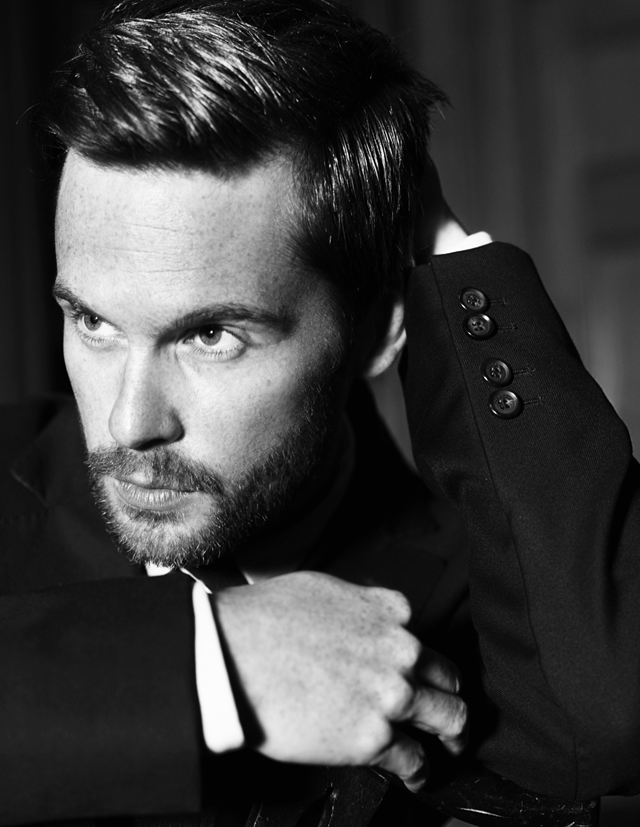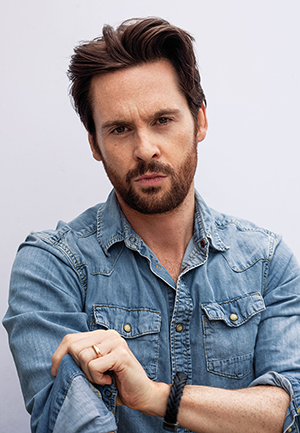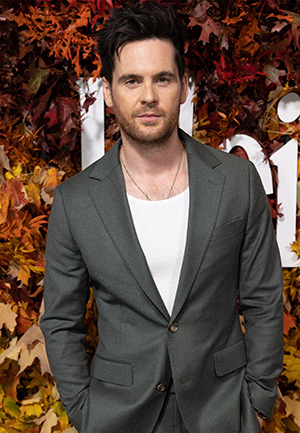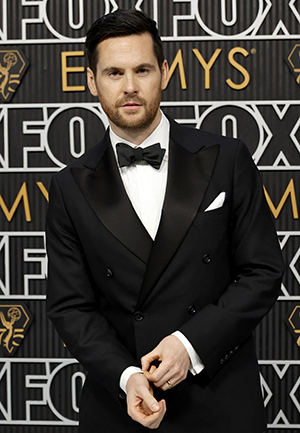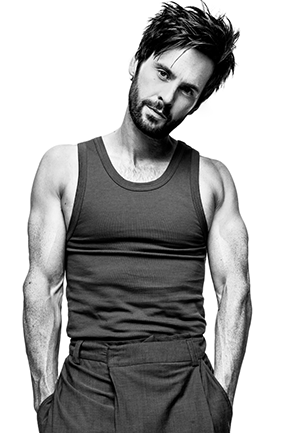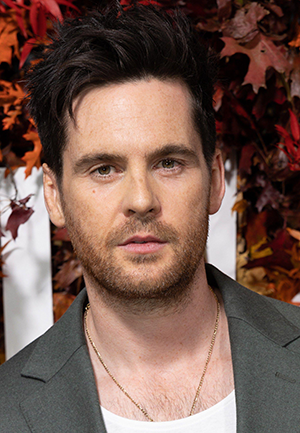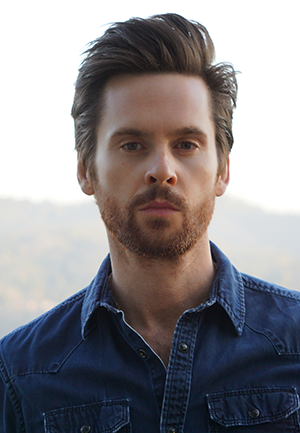Hunger TV has finally shared their interview with Tom, along with 2 photos from the Hackett London photoshoot. As well as discussing Da Vinci's Demons, Tom reveals how important fashion is and the lies he has told.
He spent his school years writing and directing plays so it’s little surprise that Tom Riley ended up on the screen. A slew of TV series lead to him being cast as the lead in historical fantasy drama Da Vinci’s Demons last year, with the second series hitting screens last week. We catch up with Tom behind the scenes of our Hackett fashion special to find out why we all need a bit of escapism from real life, and why, despite what some directors might think, he definitely wasn’t in Control…
AS WE’RE CELEBRATING BRITAIN, WHAT DO YOU FEEL IS SO EXCITING ABOUT THE BRITISH ENTERTAINMENT INDUSTRY NOW?
What an exciting melting pot it is. Every aspect of the industry in Britain is influenced by such a wide variety of cultures and backgrounds that it still feels like we’re pushing forward in a way that isn’t necessarily possible in every other country. Plus, films and TV shows are flocking to the UK to take advantage of the wealth of talent that resides here. Not least because we tend to be polite, on time… and cheap.
TALK US THROUGH YOUR HACKETT OUTFIT ON THE SHOOT, WHAT ARE YOU WEARING?
My go-to outfits tend to be scruffy rather than sharp, but I love quality tailoring when it’s well-made and bespoke. A badly fitting suit is almost worse than not dressing smart at all. The Hackett stuff is beautiful, and it may have encouraged me to be bolder with my choices when it comes to suits.
DO YOU CARRY YOURSELF DIFFERENTLY WHEN WEARING A SUIT?
Maybe. It does a lot of the work for you, as far as presence in a room is concerned, and there’s a certain quiet confident booster inherent in knowing you look sharper today than you normally do when you’ve just rolled out of bed and fallen into last night’s trousers.
HOW IMPORTANT IS FASHION TO YOU ON A DAY TO DAY BASIS?
Increasingly so. It never used to, but that’s changed in the last few years. I love the creative side of it, and I’ve begun to understand how important it is to make a good first impression, and also to find a look that you feel comfortable in. When the two collide is when you really feel its benefits. I wish it happened more.
YOU PLAY LEONARDO DA VINCI IN DA VINCI’S DEMONS – HOW MUCH DID YOU KNOW ABOUT THE ARTIST BEFORE GETTING INTO THE ROLE, AND HOW MUCH HAVE YOU LEARNT SINCE?
I knew the regular secondary-school education version of him, which had kind of mythologised him, and frozen him in stasis as an old man with a long white beard who cranked out a masterpiece every other day and spent the days in between dispensing philosophical quotes that would one day be the perfect length for Twitter. But having now read every biography available, visited exhibitions and pored through his notebooks, I discovered there was so much more to learn – from his anatomical research to his war engineering, and all the way through to his royal party planning!
WHAT IS THE MOST SURPRISING THING YOU FOUND OUT ABOUT HIS LIFE?
How anti-establishment he was in his youth, how much of an arrogant troublemaker he was, and how wary of his talent the people in authority were. He seemed to invoke a strange mixture of fear, hatred and awe from the people he worked with and for. I had always assumed he was born the wise pacifist that history remembers him as. Apparently that was not the case. It’s been fun charting the journey between those two polarities.
DO YOU FEEL A CERTAIN RESPONSIBILITY PLAYING SUCH A FAMOUS HISTORICAL CHARACTER?
Absolutely, but I’ve also been slightly let off the hook (although art historians and purists might disagree!) by the fact that this is David S. Goyer’s particular vision of Leonardo. So the world we’ve created is one that seemingly dabbles in all sorts of unusual, high-concept graphic novel tangents that allow for a heightened, more contemporary version of the man. I can appreciate why people could take a while to get used to this, but what we’ve tried to do is build a strong enough backbone based upon the relatively unknown truth as to who he was in his twenties and thirties – and then use that as a foundation for a completely new and fantastical take on him.
HISTORICAL FANTASY IS ONE OF THE MOST POPULAR GENRES ON TELEVISION AT THE MOMENT – WHY DO YOU THINK PEOPLE ARE SO DRAWN TO IT?
Well certainly pure fantasy does very well – in the form of Game of Thrones – and pure history is also successful – in the case of The Borgias or Downton Abbey. But there aren’t many shows that do what we do and weave real historical events in with the fantastical. I think people are drawn to that escapist side of it. They can enjoy both the indulgences of a period drama whilst also getting a kick out of the left-field wish fulfilment that the fantasy portion brings. Also, that latter element is what allows us to play fast and loose with history, so even if you learned something about a certain event in school, that doesn’t mean we’ll deliver on it in the way you expect. In other words, you won’t find any spoilers in your textbooks…
DO WE ALL NEED A CERTAIN AMOUNT OF ESCAPISM IN TODAY’S WORLD?
I think so. I’m sure it’s the reason why superhero stuff does so well at the box office. We love to imagine that the underdog we all see ourselves as can finally get the powers they deserve just by being bitten by a radioactive monkey, or simply by finding a magical spanner.
WHAT’S THE BIGGEST LIE YOU’VE EVER TOLD?
I once spent an entire audition pretending to a director that I was, in fact, Sam Riley, after he mistakenly thought I was and told me how much he loved Control. I’m pretty sure he worked it out whilst I was still standing in front of him, but, to our credit, we both kept it up till I left. I didn’t get the job.
